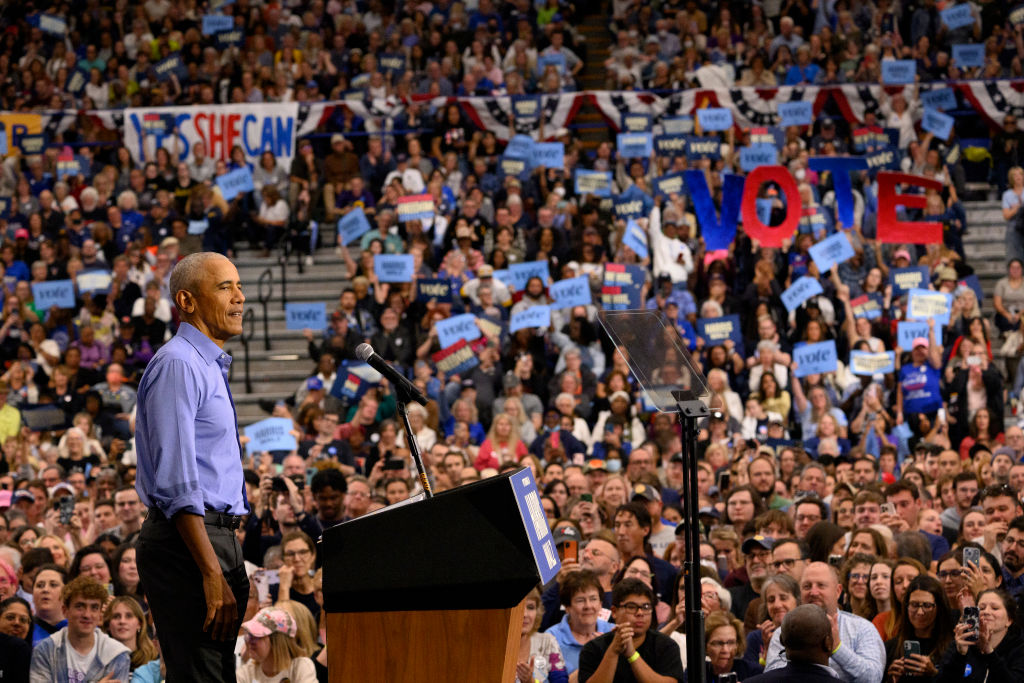Souls To The Polls: After Obama Challenges Black Men, Harris Campaign Launches Latest Black Voters Initiative
Former President Barack Obama speaks at a campaign event for Democratic presidential nominee, Vice President Kamala Harris, at the University of Pittsburgh on October 10, 2024, in Pittsburgh, Pennsylvania. | Source: Jeff Swensen / Getty
The campaign of Vice President Kamala Harris and her running mate Gov. Tim Walz is launching an initiative to court Back voters just hours after former President Barack Obama delivered a fiery speech that called on Black male voters, in particular, to support the Democratic ticket over Donald Trump.
The “Souls to the Polls” effort is set to launch on Sunday to help ramp up support among Black voters in battleground states with less than 30 days until Election Day. The initiative is being led by a National Advisory Board of Black Faith Leaders including people like Congressman Emanuel Cleaver II, Bishop Reginald T. Jackson, Bishop Leah D. Daughtry and Dr. W. Franklyn Richardson.
Noting that Harris “is the only candidate who has always been a friend and advocate to the Black Church,” the National Advisory Board of Black Faith Leaders issued a statement making the case for Black voters to support her.
“She has led the current administration in delivering real progress for Black communities across the country – from record investments in Black owned businesses to lowering health care and child care costs so that no American ever has to choose between paying bills or putting food on the table,” the National Advisory Board of Black Faith Leaders said Friday. “We are honored to join her in the fight to make true the promise of America for all.”
The Harris-Walz campaign’s latest efforts to secure support among Back voters followed public and private pitches from Obama to Black male voters during a speech in Pittsburgh on Thursday night.
Obama said Black male voters are “coming up with all kinds of reasons and excuses” not to support Harris’ candidacy, adding later that he’s “got a problem with that.”
Obama suggested sexism was influencing Black male voters – “Part of it makes me think that, well, you just aren’t feeling the idea of having a woman as president.”
Prior to the speech, Obama met with a group of Black male voters in Pittsburgh and suggested they “don’t have enough sense of what’s at stake” with the election and said they were “lucky” his wife, former first lady Michele Obama, wasn’t there speaking with them instead of him because “she talks serious about this stuff.”
Obama’s speech ignited a debate on social media about whether he was “scapegoating Black men” instead of focusing on other demographics like white men and women who have voted for Trump in the past two elections, unlike Black men.
“This accusatorial tone will make some Black men stay home-which is worse,” actor and political activist Wendel Pierce posted on X, formerly Twitter, in response to reports about Obama’s comments.
Pierce added: “Black men are questioning our party to find out what their loyalty for decades earns them. That’s good. That’s healthy. Democrats have the record to stand on and should embrace the challenge. But after touring this country specifically engaging Black men, I will not let my party leaders speak [condescendingly] towards them.”
An NAACP poll conducted and released last month found that 25% of Black male voters support Trump for president. That’s nearly double the percentage of overall Back voters (13%) who support Trump’s candidacy. It’s also a 5% boost among Black male voters compared to 2020.
Democratic-leaning groups have been doing their part to slow that momentum, including the Black Futures Lab, which through its Black Organizing Innovations Project awarded a total of $1.4 million to organizations like Black Voters Matter, the Working Families Party and Black Men Build to mobilize Black male voters ahead of the 2024 election.
Alicia Garza, Black Futures Lab’s founder and principal, said in a statement that the funds are to be used to help foster the Black male voters – “a critical part of the Black vote” – who are already actively working to protect democracy.
Citing data that showed how Black men are less likely to vote than any other demographic in America, Democratic political strategist Antjuan Seawright explained that “Black men voting isn’t an Election Day plus — it’s a must.”
“Black men are casting a generational vote in this consequential election because, from job creation and education to justice reform and reproductive freedom, this election will not just determine the future of our lives, but our entire community for decades to come,” the founder and CEO of Blueprint Strategy LLC previously wrote in an op-ed for NewsOne. “For Black men, voting isn’t a plus this year…it’s a must. It’s up to us what kind of future we build in America. It’s up to us how far we go. We are the change we’ve been waiting for.”
SEE ALSO:
A Deep Dive Into Misinformation And Influencer Impact On Black Men Voters
Every Vote Matters, But Some Black Men Don’t Realize Their Power

